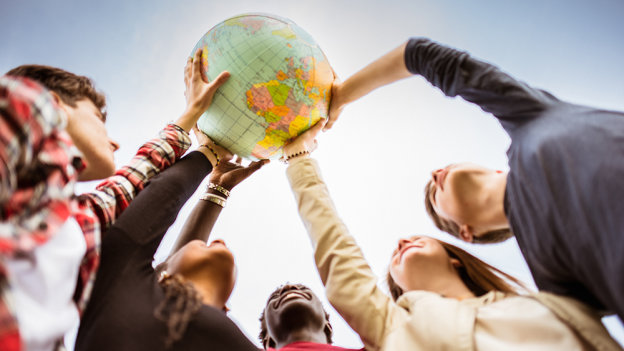Shaping change through the internationalisation of higher education institutions
 Getty Images
Getty Images
Higher education institutions have social responsibility. In view of global challenges, greater integration of academic research and teaching is more important than ever. The DAAD study “Internationalisation in Higher Education for Society (IHES) – Concept, Current Research and Examples of Good Practice” examines the role that internationalisation at higher education institutions can play for society.
UN climate summits are continually trying to motivate political decision makers to take tougher action to slow down climate change. The climate protection targets in the Paris Agreement therefore also determine current German policy when it comes to new legislation and regulations that are intended to lead to a reduction in CO2 emissions. But policy alone will not be able to solve this global social challenge – it also calls for the international cooperation of academics. “Research fields such as climate change, Earth systems and the energy transition are becoming increasingly important,” explains DAAD Secretary General Dr. Dorothea Rüland during the presentation of the German-French research programme “Make Our Planet Great Again” (MOPGA). “The focus is on the future of our Earth and our responsibility to future generations, who are the ones that will feel the effects of global climate change.” In saying so, the DAAD is making it clear that internationalisation and the social responsibility of higher education institutions are just as important as research and teaching. MOPGA-GRI, the German component of the French initiative “Make Our Planet Great Again”, is intended to make a contribution to achieving the climate goals set out in the Paris Agreement. But not just that: “The programme also contributes to the internationalisation of German higher education institutions and the participating non-university research institutes. Through MOPGA-GRI, we attract highly qualified academics to Germany and connect them with researchers all over the world, which means they also act as ambassadors for Germany and Europe.”

MOPGA
“Higher education institutions are part of society”
But it is not just about climate protection. The responsibility of higher education institutions – the “third mission” – should relate to resolving all societal problems since the academic world can no longer be considered separate from society. “All projects that the DAAD supports are connected with society and thus also with social responsibility. After all, our scholarship holders – higher education institutions, students and researchers – are part of society,” says Dr. Jan Kercher, Senior Expert in External Studies and Statistics at the DAAD. “Up to now, however, society outside higher education institutions has seldom been included directly in internationalisation measures – as an actual target group of the projects.” It is precisely this situation that the DAAD is aiming to change by increasing its efforts to motivate higher education institutions to take their social responsibility seriously: “As our next step, we are planning to examine the entire DAAD portfolio for projects that have a direct social connection. We will ask ourselves how we can expand these approaches and what good examples we can use to guide us.” A number of answers are provided by the IHES study, in which the two themes of internationalisation and the social responsibility of higher education institutions are connected with each other for the first time.
“Research and teaching are never just an end in themselves”
There seems to be little doubt about the necessity for higher education institutions to become much more involved in solving global challenges. “It is out of the question for a higher education institution to not have a social mandate. Research and teaching are never just an end in themselves,” says Associate Prof. Uwe Brandenburg, Managing Director of the Global Impact Institute in Prague. Together with three other internationally renowned higher education experts, Hans de Wit, Elspeth Jones and Betty Leask, he conducted the IHES study on behalf of the DAAD. “Two thousand higher education institutions worldwide say that the United Nations’ Sustainable Development Goals are only achievable with the help of higher education institutions”, Brandenburg adds.
Klaus Rathje (27. Februar 2020)
Exemplary international programmes
The ways in which internationalisation and the social responsibility of higher education institutions can be put into practice are demonstrated by these exemplary programmes:
- Make Our Planet Great Again (MOPGA): this German-French joint project is based on an initiative by French president Emmanuel Macron, who called out for contributions to be made in order to achieve the goals of the Paris Agreement. The DAAD is in charge of implementation on the German side, with a budget of 15 million euros from the Federal Ministry of Education and Research (BMBF). The DAAD has invited a total of 13 international researchers to come and work at research institutes in Germany for a period of four years. In regular bilateral conferences, Germany and France aim to enable sustainable networking in order to strengthen international research in the areas of climate, energy and Earth systems. The findings will serve as recommendations for political decision makers.
More information on MOPGA is available here.
- Europa macht Schule (“Europe meets School”): this programme aims to promote exchange among Europeans on a voluntary basis. Guest students from all parts of Europe present their home country in creative ways in schools throughout Germany with the aim of overcoming stereotypes through different perspectives. The programme is currently running at 35 higher education locations in Germany. It is implemented in cooperation with the “Europa macht Schule e.V.” association and the National Agency for EU Higher Education Cooperation.
More information about “Europa macht Schule” is available here.
- „PAGEL – Partnerships for the Health Sector in Developing Countries: professionals and nursing staff are in short supply in many developing countries. To counteract this problem, PAGEL aims to improve training and further education opportunities in the medical field in these countries. A lack of healthcare ultimately contributes to increased poverty. Through this programme, the DAAD aims to specifically strengthen curricula and capacity development at higher education institutions in developing countries through partnerships with higher education institutions from industrialised countries. A further important element of PAGEL is the provision of support for graduates returning to the countries concerned after completing their degree abroad.
More information on PAGEL is available here.
Special edition on internationalisation for society
The English-language academic publication “Journal of Studies in International Education” (JSIE) is planning a special edition on the topic of internationalisation for society. Manuscripts for articles may be submitted up to 1 June 2020. Articles should describe how higher education can make a meaningful contribution to society over the next 30 years.
More information about the special edition is available here.
Click here to submit a manuscript.
IHES Conference in Prague
A conference on the DAAD study “Internationalisation in Higher Education for Society (IHES)” will take place in Prague on 22–24 April. The event will focus on the question of whether internationalisation should become a key component in the future orientation of higher education institutions. The keynote speakers include Dr. Dorothea Rüland, Secretary General of the DAAD, who will present the project “Make Our Planet Great Again” (MOPGA) – in cooperation with Hamburg University of Technology, the University of Leipzig and the Leibniz Centre for Tropical Marine Research (ZMT) in Bremen.
More information about the conference is available here.
Registration is open until 15 March 2020.
Related links
Third Mission